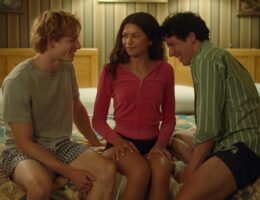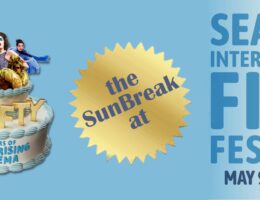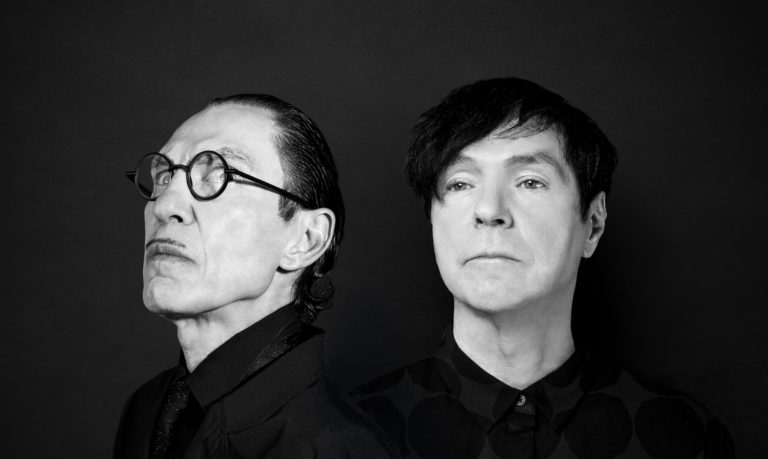The Sparks Brothers (2021 | USA | 141 minutes | Edgar Wright)
A common dictum of storytelling is “show, don’t tell.” With his new documentary about brothers Ron and Russell Mael, self-professed superfan Edgar Wright can’t resist doing a whole lot of both when it comes to Sparks, his favorite band. It is an indication of their relentless productivity that two and a half hours is barely enough time to scratch all the surfaces of a lifelong musical collaboration with roots in another band they formed back in 1967 as undergrads at UCLA all the way to a present day re-discovery and revival.
Given their unconventional underrated career and droll determined unflappability, the story of Sparks hardly fits the familiar musical biopic rhythms of inspiration, struggle, discovery, breakout success, and tragic downfall. Instead, it takes the form of a musical odyssey cataloging five decades of relentless productivity, touring, (twenty-five albums, five hundred songs) and inspired art direction. The resulting compilation of praise is one that will be embraced wholeheartedly by fellow devotees and might be a tougher sell — or one better consumed in bite sized pieces — for the freshly initiated. I count myself among the latter and occasionally found my attention waning throughout the considerable runtime but was glad for the enthusiastic introduction.
As full participants in the production, the Mael brothers appear as wry commentators on their own lives largely through a series of direct-to-camera soundstage interviews that open with cheeky opening FAQ (“We are not identical twins”, “sexual persuasion: slightly horny”). Perhaps to preserve their self-curated mystique, their personal history is limited to a cursory run through their upbringing as the children of artistic parents, fondness fo family trips to the movies, and surprising athletic success, and the loss of their father at an early age. Along with their old photos and grainy family videos, Wright sets the stage for the tumultuous arrival of rock and roll counterculture with an encyclopedic montage of images and historical clips. Taking inspiration from contemporary British bands like the Who and the Kinks, visual inspiration from the French New Wave, their college years find them embracing their own theatricality to form a band.
Wright dutifully respects the performance art that they’ve spent a lifetime constructing, and rather than attempt to pry behind the curtain of their carefully-cultivated image, instead traces the many highlights of their long discography. In the ensuing years since their start, the brothers remain the only constant in their ever-morphing band, shedding members, changing their name (quickly dropping “Half Nelson” for the more-marketable “Sparks”), and gaining more attention overseas after struggling to find a foothold in Los Angeles. Alongside cleverly captioned interviews, their trajectory is illustrated with their deep collection of quirky music videos, oddball television appearances, and supplemented by animations of both the creepy clay stop-motion and funny hand drawn comic strip varieties.
While they do rise to some level of mainstream fame in the 1970s and 80s (airplay on MTV, crowded concert halls, befuddled buzz for the questionable embrace of the Chaplin/Hitler mustache), the film contemplates the paradox of a storied career that is highly influential yet criminally overlooked. In a sense, it serves as a broad platform for all of their famous fans to put their fandom on the record. The IMDB cast list stretches to 77 credited interviewees plus the voice acting work of Simon Pegg and Nick Frost as two Beatles), each more eager than the next to tell you why Sparks are amazing. Fellow weirdo Beck is the most prominent of the many white guys who appear these onscreen testimonials, but it’s a full house: Wright himself shows up on the other side of the camera (captioning himself as “fanboy”); former bandmates, label execs, and influential producers (Todd Rungren: “rock god”) turn up to sing praises; comedians like Patton Oswald, Mike Meyers, and Fred Armisen elaborate on craftsmanship; musicians from Duran Duran, Erasure, Franz Ferdinand, and even the voice of Bjork express their admiration and detail how they were shaped by Sparks. At one point, these guests compete to heap the most praise on the genius of a song that’s five minutes of one repeated lyric. The near universal admiration makes it a bit challenging for an outside observer to get any unbiased sense of their true place in the culture, but this reality distortion field seems very much in keeping with the band’s ethos.
Through these many tributes, Wright lovingly builds a maximalist temple to a remarkable band whose perseverance, obsessive instinct for creation, modest lifestyle, and careful financial stewardship allowed them to be true to themselves, survive elements of creative self-destruction, reinvention, and a few long dry spells to come out on the other side playing to large festival crowds and having Annette, the musical that they wrote with director Leos Carax and starring Adam Driver and Marion Cotillard, chosen as the opening selection for this year’s Cannes film festival. While it does serve as comprehensive introduction to newbies, The Sparks Brothers feels mostly like a film that exists to allow Sparks superfans to convince viewers of their superfandom. While the long series of unqualified praise might begin to feel a bit lonely to people outside the bubble, I guess that’s fine. Who else but a true believer or someone ready for a deep dive is committing themselves to a 2.5 hour movie about an obscure and/or popular band anyway?
The Sparks Brothers arrives in theaters this weekend for longtime superfans and adventurous onlookers alike.
Header photo, credit Anna Webber via Focus Features.




